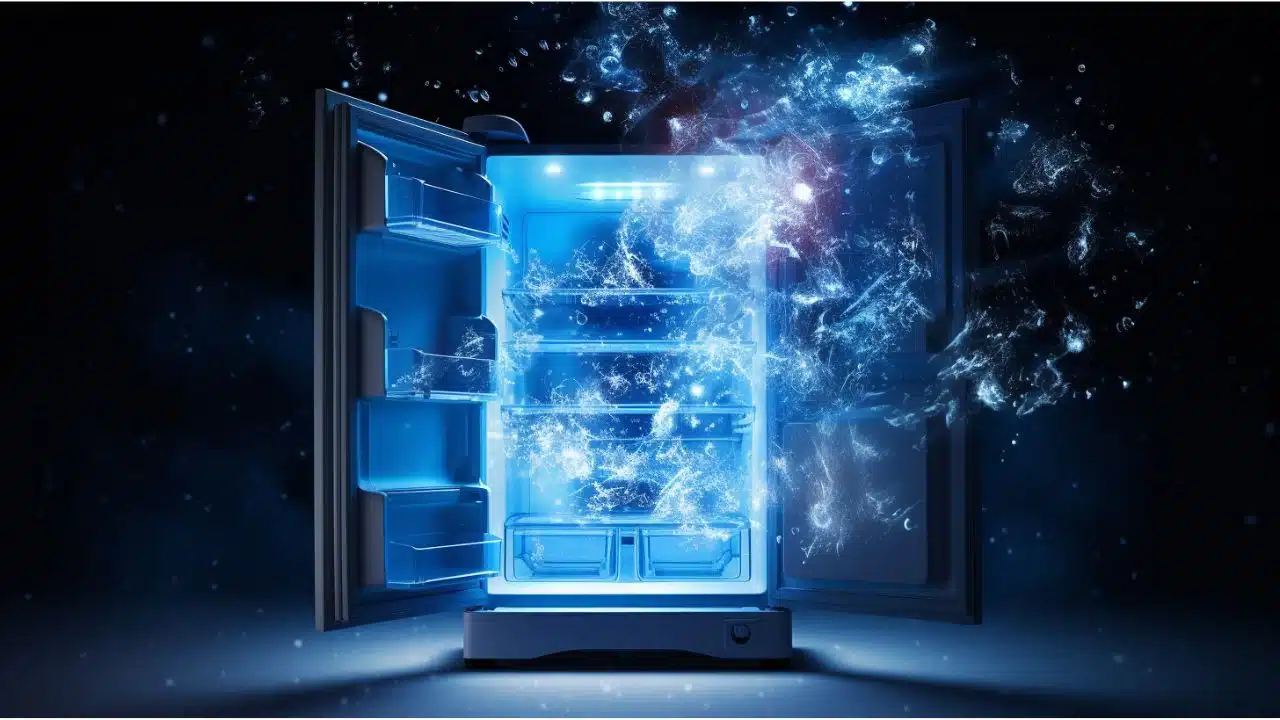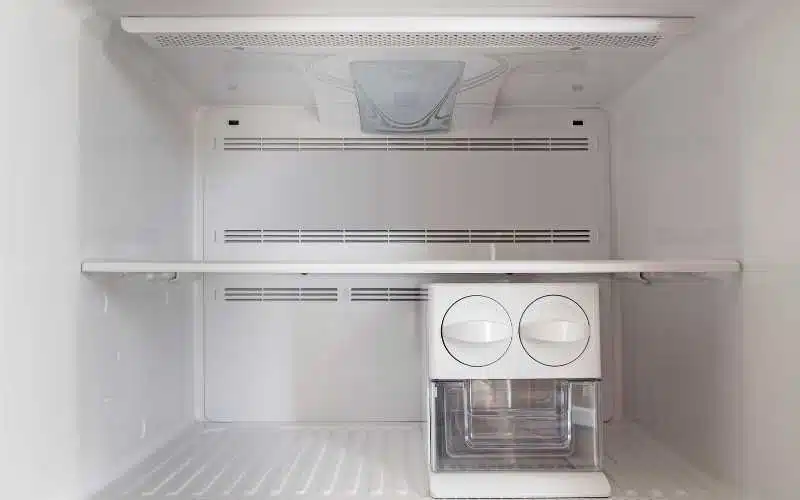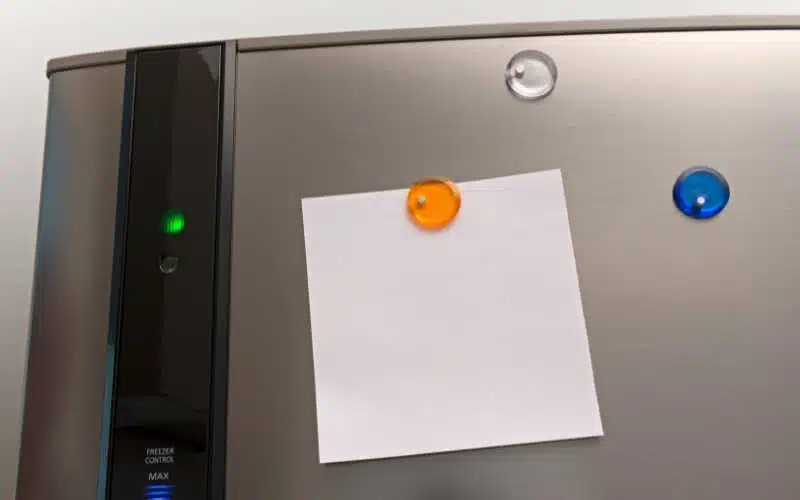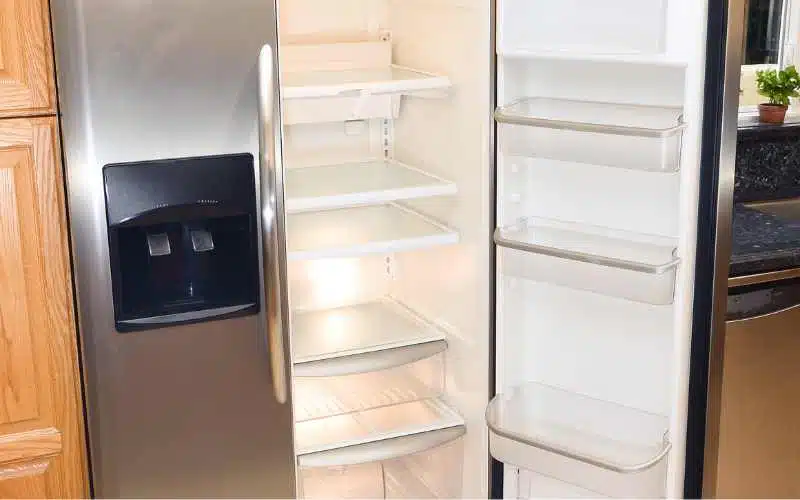Home appliances like refrigerators preserve food, ingredients, and other edibles for a long time. It would be best if you looked out for a model that suits your taste when purchasing a refrigerator.
Having it in your home is highly important. No matter how good your appliance is, it can constantly develop faults.
For this reason, you should maintain your refrigerator properly. This maintenance process helps prevent future problems. So, many people ask if I can plug my refrigerator into a regular outlet.
You can plug your refrigerator into a regular outlet. These regular outlets can start a refrigerator, but they can be dangerous. Don’t use a regular outlet for heavy-duty appliances like refrigerators, washers, and ACs. Instead, it’d help if you used a dedicated circuit. Dedicated circuits have a breaker that will switch off if there is a fluctuation in the current.
Can a Mini Fridge Be Plugged Into a Regular Outlet?

You can plug a mini fridge into a regular outlet. An outlet with 110-120 volt voltage can keep the fridge running.
To set up a mini fridge with a regular outlet,
#1. Test the Outlet
Make sure you test the outlet to know if it is working or if it can produce the voltage the fridge needs to run safely.
You can plug other appliances in to test the outlet. Plug your mini fridge to test the outlet as well. If the outlet does not spark and the fridge does not flicker, the outlet works perfectly.
#2. Avoid Using Extension Cords
Do not use an extension cord for your mini fridge. You can use the extension cords for smaller appliances, not the mini-fridge.
Extension cords can cause damage to your fridge. Instead, maintain direct contact between your fridge and the outlet.
#3. Do Not Install the Fridge Close to a Water Source
Do not install your fridge close to a source of water. If electricity comes in contact with water, it can damage the device or cause a fire hazard.
Instead, find a suitable outlet not close to a water source to keep it safe. Ensure a reasonable distance between you, the outlet, and the fridge.
Do not sleep next to it. If you keep a fridge too close to you, it can cause fire hazards. Instead, keep it far from your room, so you do not bump into it.
What Kind of Outlet Should a Refrigerator Be Plugged Into?
You can plug a refrigerator into a regular outlet having a voltage of 110-120. However, these outlets can be dangerous, so you should connect your refrigerator to its circuit.
These dedicated circuits reduce the risk of fire and electrocution. In addition, it serves a single appliance and prevents it from tripping your circuit breaker.
The standard dedicated circuits for appliances are 15-20 amp circuits and 30-50 amp circuits.
The 15-20 amp circuits are for appliances like toasters, mixers, etc., and keep them running without interruptions.
The 30-50 amp circuits are for appliances like washers, dryers, electric ovens, refrigerators, etc.
Refrigerators are heavy-duty appliances that need a dedicated circuit that offers double protection to avoid overloading your electrical system. Do not use extension cords for your refrigerator.
You can use a GFCI circuit breaker for your refrigerator in areas with lots of moisture.
However, GFCIs are prone to tripping; that is, they can shut power off to the circuit if there are power fluctuations. They have sensors that monitor outgoing and incoming currents.
If your refrigerator is not in a place where water or moisture gets to it, you do not need a GFCI outlet.
However, one disadvantage is that refrigerators can cause unwanted trips that you may not notice early enough.
Do not connect your refrigerator to a surge protector. Surge protectors are very sensitive to current overloads and can shut themselves down. If there is a power surge, the refrigerator might not start.
What Would Happen If You Plug Your Refrigerator Into a Regular Outlet?
If you plug your refrigerator into a regular outlet, it could pose safety hazards. Fluctuations in power are one of the leading causes of damage.
If there is an increase in voltage from the outlet, there will be an increased flow of electrical current in the refrigerator.
This increased current flow leads to extreme temperatures and damages several refrigerator parts.
The components prone to damage are:
- The ice maker
- The compressor
- The control board
When there is extreme heat within the component, there will be a shortage in the ice maker’s electrical connections.
If the parts are available, they can you can easily replace them. Extreme temperatures can also damage the compressor.
The windings that provided the run function become damaged, leading to compressor failure.
If the compressor is damaged, you may have to replace the refrigerator because the replacement cost is high.
The control board is the most sensitive part of the refrigerator. If it is damaged, you can easily replace it.
Can a Refrigerator Be Plugged Into Any Outlet?
You cannot plug a refrigerator into any outlet. Fluctuations in power can make the refrigerator lose its effectiveness.
Do not plug a refrigerator in a garage. In a garage, there are GFCI outlets that are not reliable. GFCI outlets cannot carry the load, and the refrigerator will keep tripping the outlet.
Instead, plug your refrigerator into an outlet with 110 to 120 volts and install a dedicated circuit.
These dedicated circuits maintain electric flow and ensure your refrigerator runs smoothly.
When a refrigerator reaches its peak usage, it can run up to 15 amps. However, it may have operating issues, so you should install a dedicated circuit.
Since the refrigerator runs in different amps, a dedicated circuit will enable the proper flow of electricity.
Most regular outlets can run a refrigerator, but you should use a circuit for the refrigerator only to prevent flickers.
Things to Consider When You Plug Your Refrigerator Into a Regular Outlet
When you plug an appliance into an outlet, it draws power from your home’s electrical system supply.
Different outlets carry different current ratings and voltages and have varying levels of protection when there are fluctuations in power.
There should be dedicated circuits that will meet the requirements of heavy-duty appliances like refrigerators, washers, dryers, etc.
The things you should consider when you ugly a refrigerator into any outlet are
- The voltage of the outlet
- The kind of outlet
- Location of the outlet
#1. Voltage Of the Outlet
Each outlet carries different voltages. If the outlet’s voltage is not high enough for the refrigerator, you will overload the outlet.
Overloading will lead to extreme temperatures and create a fire hazard. I’m sure you will not want this, so check the outlet’s voltage before you plug your refrigerator.
#2. The Kind Of Outlet
The kind of outlet is something you need to consider before you plug your refrigerator into any outlet.
#1. 15A, 120 Volt Outlets
They come as two-prong and three-pronged outlets. The two-pronged outlets have only two slots, while the three-pronged outlets have three slots, preventing electric shock from loose wiring.
#2. 20A, 125 Volt Outlet
They support appliances with higher amps ( appliances that draw more power).
#3. 20A, 250 Volt Outlets
They support appliances like air conditioners, and they need a double pole circuit breaker.
#4. GFCI Outlets
Ground fault circuit interrupters or GFCIs can cause particular problems like your refrigerator going off unexpectedly.
In most areas, electricians install this circuit breaker into the outlet so that if the appliance you connected to it comes in contact with water, the appliance will turn off.
These outlets automatically respond to ground faults. It turns off randomly when it should not.
For example, refrigerators always trip this circuit breaker off because they need enough power to function.
Current flows through the wires, and if this electricity strays from its original path, the GFCI cuts power to the outlet.
| Pros of GFCI Outlets | Cons of GFCI Outlets |
|---|---|
| GFCI sensors observe incoming and outgoing current and automatically shut power if there is an imbalance in the current. | It trips off randomly. |
| They keep you safe from electrocution in areas with moisture. | Food and other edibles can get spoiled without you noticing it. |
Refrigerators do not necessarily need these outlets. You should check the kind of outlet you have before you plug your refrigerator.
#5. Tamper Resistant Outlets
These outlets have a built-in barrier that prevents the entry of foreign objects.
#6. Switched Outlets
These outlets are strictly for appliances that you plug in always. Other outlets are AFCI outlets, USB outlets, Smart Outlets, etc.
#3. The Location of the Outlet
Do not plug in your refrigerator in areas with a lot of moisture. If you plug your refrigerator in such areas, you will expose yourself to many risks like fire hazards and electrocution.
Conclusion
Refrigerators can last up to 17 years or more with proper maintenance. Although a regular outlet can start a refrigerator, it can be dangerous to use.
Instead, install a dedicated circuit to offer double protection if there is power fluctuation. A single circuit will keep your refrigerator running smoothly without interruptions.





